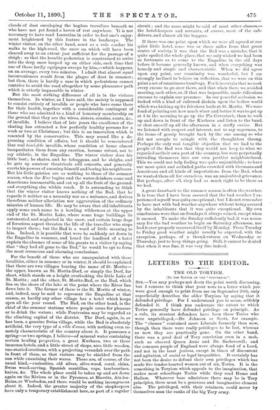LETTERS TO THE EDITOR.
THE OLD TORYISM.
[To THE EDITOR. Or THE " SPECTATOR.") SIR,—You may perhaps not deem the point worth discussing, but I venture to think that your note to a letter which you
were good enough to print from me on September 20th, only superficially describes the older Toryism by saying that it defended privilege. For I understand you to mean, selfishly defended it. I think you underrate the extent to which Tories generally have defended privilege on principle. As a rule, its stoutest defenders have been those Tories who were unprivileged,—Dr. Johnson or Scott, for example. The " classes " contained more Liberals formerly than now, though then there were really privileges to be lost, whereas as now, they are practically gone. On the other hand, there was a good deal of Tory conviction even in a mob, such as cheered Queen Anne and Dr. Sacheverell ; and the common people of England were always fond of a Lord, and not in the least jealous, except in times of discontent and agitation, of social or legal inequalities. It certainly has not been the desire to defend their own privileges which has made five tender-hearted women out of six, Tories. It is the something in Toryism which appeals to the imagination, that makes most schoolboys Tories while they read Hume and Fiallam. Whatever base admixture there may be in Tory principles, there must be a generous and imaginative element also. The privileged, with their retainers, could never by themselves man the ranks of the big Tory army. If we look over the list of privileges which have been swept away, it is not necessary to impute merely selfish motives to their defenders. Dr. Liddon opposed Irish Disestablishment and the Repeal of University Tests. But he did so because he considered the privileged position of the Anglican Church in Ireland and in Oxford to be for the glory of God and the good of the country. The opposition to the repeal of the Corn Laws may seem to have been as selfish as anything in the history of Toryism. But, apart from any economical defence of Protection, it undoubtedly was the conviction of most Tories that politically and socially it was a bad thing to exalt commerce at the expense of agriculture. Thousands opposed the repeal who had not a rod of land. Purchase in the Army was defended under a kind of feeling that it was a better thing for the Army to be officered by gentlemen of birth than by men who could get marks for history and spelling. In a word, the bulk of the "Old Tory" Party were always people who had nothing to gain or lose personally by victory or defeat.
The New Conservatives have accepted democracy as a fact. Yet the love of inequality for inequality's own sake is deeply seated in the hearts of half the men in the Kingdom, and nearly all the women. Probably most of us would like to be privileged ourselves. If that cannot be, we wish somebody else to be privileged. We take no enlightened pleasure in seeing a Duke dress like his butler, or a dairymaid like the Squire's daughters. We feel no shame whatever in walking into dinner after stupid Sir Giles. We object on principle to the President of the Wesleyan Conference sharing the Primate of All England's seat in the House of Lords. This is the "defence of privilege" as far as we dare or think expedient. But it is not necessarily selfish, nor, I think, necessarily foolish.—I am, Sir, &c., AN OXFORD FELLOW.
[Is not our correspondent in error about Dr. Liddon ? He supported Mr. Gladstone in and after the Irish Disestablish- ment.—ED. Spectator.]



















































 Previous page
Previous page